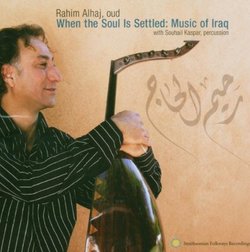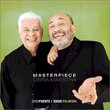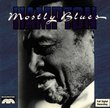| All Artists: Rahim Alhaj, Souhail Kaspar Title: When the Soul Is Settled: Music of Iraq Members Wishing: 2 Total Copies: 0 Label: Smithsonian Folkways Original Release Date: 1/1/2006 Re-Release Date: 10/24/2006 Genres: International Music, Pop Styles: Middle East, Iraq Number of Discs: 1 SwapaCD Credits: 1 UPC: 093074053324 |
Search - Rahim Alhaj, Souhail Kaspar :: When the Soul Is Settled: Music of Iraq
 | Rahim Alhaj, Souhail Kaspar When the Soul Is Settled: Music of Iraq Genres: International Music, Pop
Rahim Alhaj is the caretaker of a vital strand of Iraqi musical tradition. He learned in Baghdad with Munir Bashir and other great 20th-century player/teachers. AlHaj left Iraq under political pressure in the 1990s, re... more » |
Larger Image |
CD DetailsSynopsis
Album Description Rahim Alhaj is the caretaker of a vital strand of Iraqi musical tradition. He learned in Baghdad with Munir Bashir and other great 20th-century player/teachers. AlHaj left Iraq under political pressure in the 1990s, resettling in New Mexico, and now shapes his musical inheritance for future generations in his own way, in his own time. These nine extended improvisations on the oud, the short-necked Arabian lute, treat us to a creative artist's impression of a proud tradition meeting modernity. Souhail Kaspar accompanies AlHaj on Near Eastern percussion. Extensive bilingual notes, photos, bibliography and discography included. 9 tracks, 73 minutes of music, 32 page booklet. Similar CDs
Similarly Requested CDs
|
CD ReviewsSoul-settling, cathartic statements with improvisation & Ira J. Ross | Roseburg, OR USA | 08/05/2007 (5 out of 5 stars) "Playing Time - 73:26 -- Rahim Alhaj is a master of the oud (Arabic lute). All but one of the nine tracks span between 7-11 minutes. Alhaj's original taqsim (instrumental improvisations) provide a contemporary interpretation of maqams (the unique pitches on the Arabic musical scale along with their melodic movement). Alhaj's material is also rooted in and derived from this Iraqi musical tradition. For example, "Taqsim Maqam Hijaz" includes a rendition of the famous Iraqi song "Atop the Palm Tree." In fact, each piece includes improvisation followed by a famous song. While it might have been more interesting for some of the pieces to be arranged with a fuller maqam ensemble sound of spike fiddle (joza) and dulcimer (santur) too, some of the cuts do feature percussionist Souhail Kaspar plays goblet drums (tablah, dumbak) and small tambourine (riqq). Apparently, he didn't use a frame drum (daf) that maqam ensembles sometimes include. In "Taqsim Maqam Sika" and "Taqsim Maqam Hijaz," the riqq (or daff) makes its most prominent appearance and provides for a colorful expression in that piece. Born in Lebanon, Kaspar studied music in Syria but now makes his home in Los Angeles. While the 32-page CD booklet could have said more about Kaspar's instruments, the bilingual musical explanations for each track are educational. A prodigy who began playing oud at age nine, Rahim Alhaj subsequently graduated from Baghdad Conservatory in 1990. He also holds a degree in Arabic Literature. In 1991, after the first Gulf War, Alhaj's activism against the Saddam Hussein regime led to is forced move to Jordan and Syria. The political refugee relocated to the U.S. in 2000 and now lives in Albuquerque, N.M. There, he won the 2003 Albuquerque Arts Alliance Bravo Award for Excellence in Music. On this album (his fourth overall), the accomplished and proficient musician says that the intent of each piece is to reflect the maqam tradition and, in doing so, to settle the soul. He does a fine job of introducing us to the musical and aesthetic of the Iraqi style. Rahim's music has both delicate and forceful moments. Its full-bodied essence speaks forcefully as he combines traditional Iraqi maqams with more contemporary inspiration and insight. While this kind of improvisational global sound may be novel to many westerners' ears, its strength is its creativity and imagination that take us on an impressive 73-minute atmospheric journey. His closing number, "Taqsim Maqam Saba" is an emotional expression of sorrow and grief. There also seems to be a prevalent thread in his compositions for peace, hope, optimism and compassion in the future. Undoubtedly, Rahim misses his homeland, but he also makes soul-settling and cathartic musical statements about his musical rejuvenation and personal renewal in the United States. (Joe Ross, Roseburg, OR.) " The "Must-have" Arabic Music CD of 2006 World Music Afficionado | USA | 12/24/2006 (5 out of 5 stars) "This CD of traditional Iraqi music, including songs, maqams and improvisation featuring Rahim Alhaj, the Iraqi oud master taught by Munir Bashir in Baghdad, with Souhail Kaspar, Lebanese percussionist, is exceptional. Through his music and high level virtuosity, this brilliant artist is able to portray a wide-range of emotions--from haunting sorrow and angst to joy and passion. This album is such a delight to listen to that it has become one of my very favorites. Rahim Alhaj's musical message of compassion, peace and understanding between cultures is furthered in this recently released CD. I really enjoyed hearing his personal and musical story featured on NPR All Things Considered this week. This CD is a "must-have"!" Absolute bliss! Work of Life | Miami, Florida USA | 02/21/2009 (5 out of 5 stars) "This has become one of my new favorite CDs. Very soothing and sophisticated music. Excellent production. Makes you feel good to listen to it and quite danceable too. Bravo!"
|

 Track Listings (9) - Disc #1
Track Listings (9) - Disc #1










